Six months ago, the European Broadcasting Union (EBU), the organizer of the Eurovision Song Contest (ESC), decided to keep the slogan inaugurated at Eurosong in Liverpool. Ukraine had won the previous year’s competition, but due to the ongoing war, the United Kingdom took over the organization of the 2023 event. The slogan ‘United By Music’ aimed to highlight the bond between the two countries, and the rest of Europe.
Eurovision, the event that insists on being neutral and non-political, became the most controversial in its history during the 2024 edition
After EBU’s adoption of the slogan as permanent, we could see it this year in Malmö, Sweden, too, displayed on a large screen between acts. But the reality has changed from 1956, when post-war Europe decided to compete with songs instead of arms. As the world becomes more divided and complex again, is the slogan turning outdated, or at least naive? Can it withstand the test of time? Or is Eurovision at risk of becoming the orchestra that continued playing as Titanic went down?
Martin Österdahl, the ESC’s Executive Supervisor, insisted when ‘United by Music’ was launched, “It’s the perfect slogan to underline our values of inclusivity, equality, universality, and celebrating diversity through music. As we approach our 70th anniversary, we feel we have found a slogan that truly encapsulates our brand.”
However, the event that insists on being neutral and non-political became the most controversial in its history during the 2024 edition. In a single year, questions on war involvement, gender politics, and even religion, disturbed the spirits, with endless debates on what would be a fair voting system. These questions revealed that the continent, diverse as it is, is still far from uniting behind those core values and bridging differences. In fact, Europe doesn’t seem to be united by music. Or by Eurovision.
Switzerland vs. Croatia – cracking the code
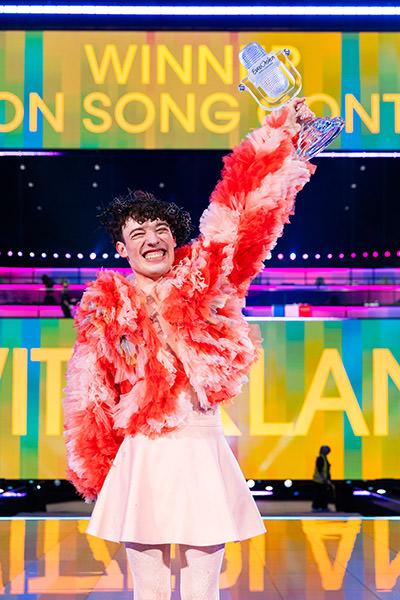
In 2025, Eurovision will be heading home, to the country where it all began in 1956. Switzerland‘s Nemo Mettler won the competition with “The Code”, a genre-bending anthem that fuses everything from drum and bass to opera, almost like a sonic representation of their journey to non-binary identity.
This year’s runner-up was Croatia‘s Baby Lasagna (a.k.a. Marko Purišić) with “Rim Tim Tagi Dim”, another song bringing together music styles, ranging from ethno to techno. Despite its fun, danceable exterior, Lasagna’s rock act was also politically engaged, shining a light on the economic emigration of young Croatians.
Baby Lasagna sings about selling his cow. As he is from Umag, that would probably be the famous Istrian cattle - boskarin!
While the Swiss contestant seduced the professional jury, the Croatian was the televoters’ favorite. Ranked third by the jury, Baby Lasagna still couldn’t push Nemo out of balance (who ended only fifth in public votes, behind Croatia, Israel, Ukraine, and France).
This felt like déjà vu, bringing back the memories of 2023 when the audience’s favorite Käärijä from Finland (“Cha Cha Cha”) lost out to the jury’s first choice – Loreen from Sweden (“Tattoo”). So fans are fuming again.
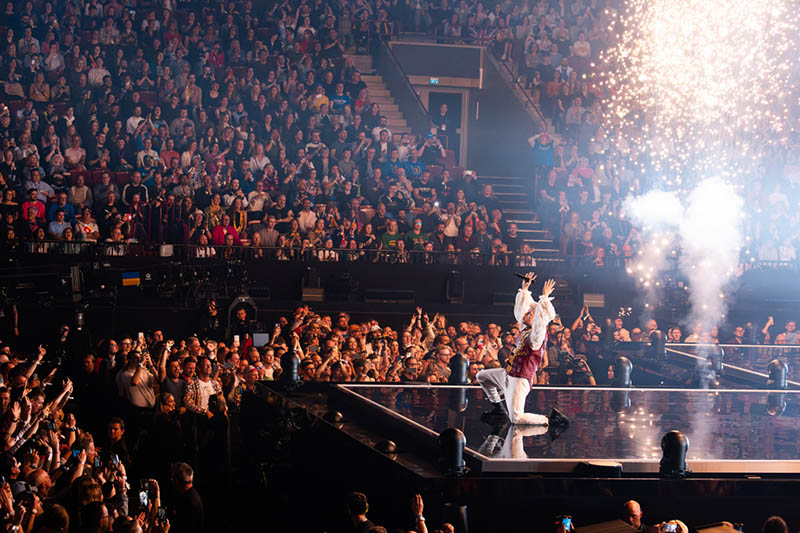
Hidden behind the code of secrecy, juries leave space for unfair games inside, and for conspiracy theories on the outside. For instance, in Turin in 2022, the votes of six national juries were rejected when they were caught cheating. Though public votes technically hold more weight in the rare event of a tie (ties happened only in 1969 and 1991), professional juries still have significant power in reshuffling the final order.
Cue the “jury-victim” narrative, most often voiced by fans of countries that didn’t make the cut. Nemo’s win over Baby Lasagna was received quite passionately by supporters of Croatia, a country that just formed the most conservative government in its history, with a party pledging to eradicate “gender ideologies”.
The tendency toward hate speech was unleashed in the comments under some of my Facebook AI images that went viral. The commenters stood up against the ‘faggotvision’, calling Nemo ‘that’, ‘it’, ‘that thing’, and ‘f**king freak’. Some interpreted the broken trophy as an ‘act of God’, while others explained Baby Lasagna didn’t win – “because he is Catholic’. The most radical commenters yelled that ‘fags rule Europe’, calling for ‘d3ath to gays’ and sending messages such as ‘This world is going to end sick people she/he and faggots don’t deserve to be alive’.
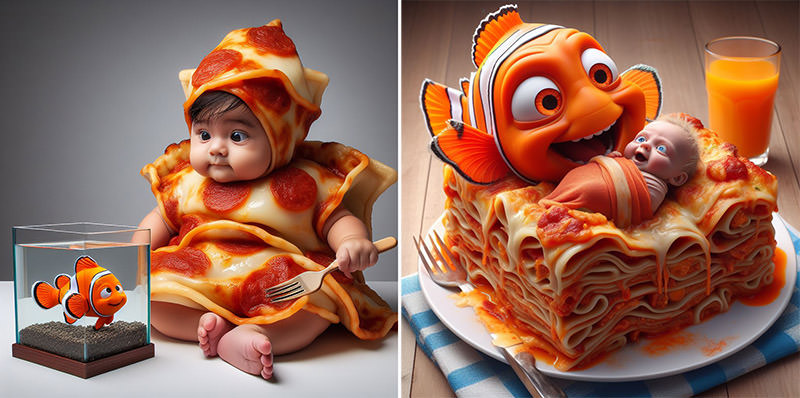
Can you handle AI art? Facebook is flooded with AI images, and not all of them are used for amusement!
Ireland – pentagram vs. hexagram
Nemo wasn’t the only non-binary person competing on this year’s Eurovision stage. Bambie Thug (Bambie Ray Robinson) from Ireland performed “Doomsday Blue”, a song they describe as ouija-pop. This practician of neopagan witchcraft conjured magic the ESC hadn’t seen before, performing inside a candle-lit pentagram, with the message ‘Crown the Witch’.
Of course, a spellbinding artist who strips down to a scant costume in transgender flag colors found strong opposition among Irish far-right politicians signing petitions against them. Bambie Thug didn’t just raise the critics in their predominantly Christian home country, but also quite a few eyebrows abroad.
Despite Eurovision being a long-standing haven for the queer community (from Dana International to Conchita Wurst), the competition’s country-versus-country format is rather traditional. Viewers who still have to embrace Österdahl’s idea of diversity could perceive Bambie’s avant-garde act as something straight out of a ‘freak show’.
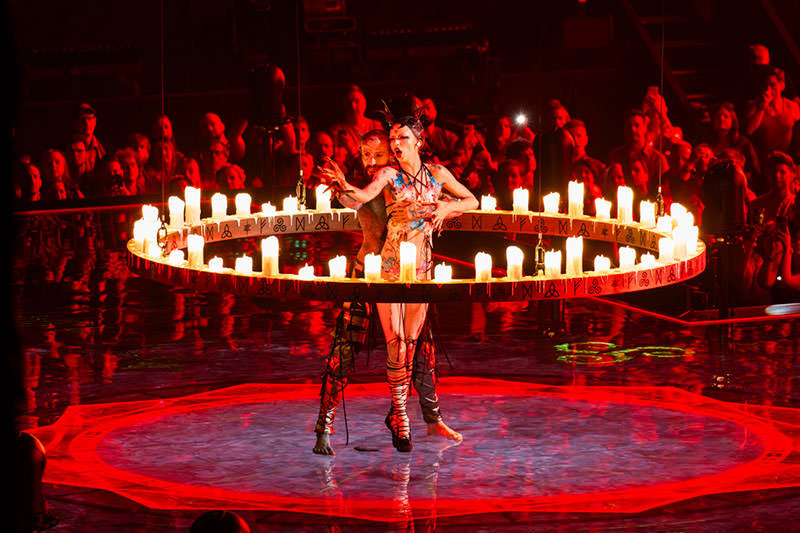
Before the Irish performance in the first semi-final, KAN, the Israeli public television, warned viewers of “spells and black magic”, “Satanic symbols”, and “voodoo dolls”. The commentator even asked viewers to “prepare their curses”, while noting the singer’s tendency to “speak negatively about Israel”.
Of course, Israel’s concern with Bambie had little to do with religious concerns. The Irish performer proudly displayed a Palestinian keffiyeh scarf and had ‘ceasefire’ and ‘freedom for Palestine’ painted on their face in Ogham script (until the EBU stepped in and ordered the make-up change). Bambie was not shy of expressing their pro-Palestinian voice, as well as displeasure with Israel making it to the grand final.
After finishing sixth in the contest, the masks fell, and Bambie stood up against the “horrible atmosphere” at Eurovision. They complained that Israel’s public broadcaster repeatedly incited violence against them. In a mic drop moment, Bambie praised the community though: “We are what Eurovision is. The EBU is not what the Eurovision is. F**k the EBU. I don’t even care anymore. F**k them.”
Israel – no hurray for Hurricane
Israel’s contestant Eden Golan had to endure much more than just Bambie Thug (the Israeli delegation asked to be moved to another room in the arena, away from the “mad” Irish singer). Thousands of people protested against Israel’s Eurosong participation in Malmö, culminating in the Stop Israel march. Even Greta Thunberg appeared, stating: “We will not accept that a country currently committing genocide is allowed a platform to artwash themselves.”
After being forced to change the lyrics of the song originally called “October Rain” (referring to Hamas October 7 attacks), Eden performed “Hurricane” with a chorus of audience boos as back vocals.
Europe was not united by music. Critics pointed out that the EBU was quick to expel Russia from the competition after the Ukraine invasion, but used a different measuring stick for Israel, doing little more than tweaking some lyrics. Despite loud calls from Nordic countries (including the Swedish host) to ban Israel from competing, the EBU decided not to act.
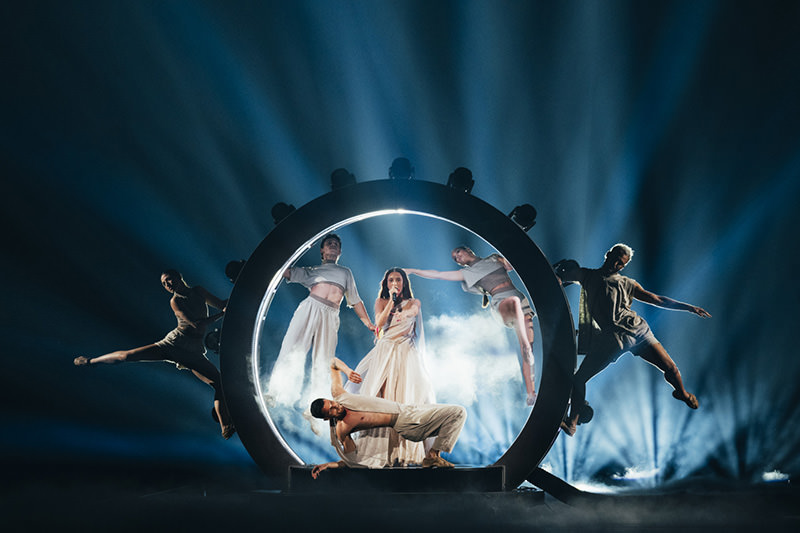
In this tense atmosphere, and with Eurovision’s strict no-politics policy (even EU flags were banned from the finals due to – “heightened geopolitical tensions”?!), artists could only make subtle acts of free speech.
France‘s Slimane Nebchi interrupted his final dress rehearsal to say: “We need to be united by music, yes, but with love for peace. United by music, yes, but with love for peace.” Sweden‘s 2011 Eurovision winner Eric Saade sported a Palestinian keffiyeh around his wrist during his half-time performance. Portugal‘s Iolanda Costa, who managed to discretely paint keffiyehs on her nails, finished her performance by declaring that “peace will prevail”. Bambie made a similar address: “Love will always triumph hate!” Peace penetrated Nemo‘s victory speech too: “I hope that this competition continues to stand for peace.”
Some jury announcers joined the subtle rebellion. France urged “everyone to look for love and for peace”. The Austrian announcer wore a T-shirt displaying the word ‘Equality’. Käärijä, who apologized after the backlash for the dancing video with Israel entrant, stepped down from being the Finnish spokesman in the grand final: “Giving out the points does not feel right.”
The Norwegian jury spokesperson Allesandra Mele (the singer of “Queen of the Kings” in 2023) also withdrew from delivering the results by saying: “United By Music – Eurovision’s motto – is the reason I do music. Unite people, bring them together. But right now those words are just empty words. There is a genocide going on and I’m asking you all to please open up your eyes, open up your heart. Let love lead you to the truth. It’s right in front of you. Free Palestine.”
The Netherlands: Europa, pa-pa!
Joost Klein, who was vocal at an earlier press conference about Eden Golan’s participation in the competition, could have been another artist who delivered a political statement in the final, if he had participated, that is. The situation with the contestant representing the Netherlands confirmed that EBU’s rulebook has rather unusual standards on what deserves a disqualification.
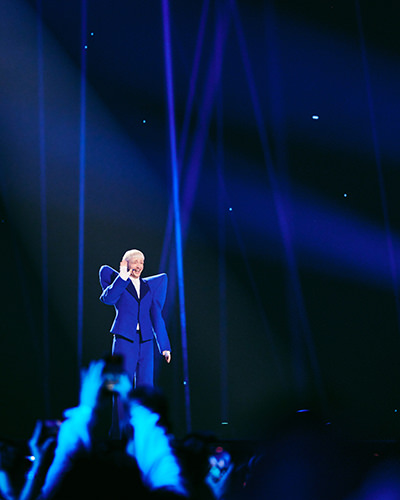
Nobody knows yet what truly happened, but the promising Dutch act “Europapa” had to go home because the performer made a “threatening move” towards one of the crew members. Supposedly, Klein repeatedly asked not to be filmed as he rushed to the green room, but the camerawoman did not respect that. The gesture was classified as a backstage incident that deserves not only police intervention but also a disqualification from the finals.
Dutch broadcaster AVROTROS already protested against the disproportionate punishment for what happened. Other public broadcasters, those from Slovenia, Croatia, Portugal, Spain, France, and Norway, also expressed concerns and dissatisfaction with EBU’s conflict management skills at Eurovision 2024. United by protest, at least.
United by Music, Divided by EBU – Conclusion
In the year Eurovision Song Contest decided to permanently adopt “United by Music” as its slogan, it seems Europe is more divided than ever.
Beyond just listening to the whistles against Israeli contestant, Martin Österdahl received his fair share of boos too, when he was forced to deliver the votes of the Dutch TV, expelled from the contest. The “we are good to go” man, who was practically celebrated as some magnetic euro-daddy, lost the sex appeal of yesteryears.
The orchestra may keep playing as long as the conductor wants, but if nobody patches up the leaks, we’re all gonna need a new boat
The public wants to be united by music, but it also expects EBU to be reunited with common sense. Equality shouldn’t be just a catchy motto that protects the European landscape of differences, but one that also guarantees the decisions of the contest organizer will use the same metrics for everyone.
The abrupt expulsion of the Netherlands compared to the EBU’s selective vision when it comes to Israel’s reality (especially after the Russia experience) has raised reasonable concerns, as well as lowered trust in the management of the event.
Concerns have not been properly addressed, and the effort to restore trust feels about as noticeable as a quiet fart in a thunderstorm.
The orchestra may keep playing as long as the conductor wants, but if nobody patches up the leaks, we’re all gonna need a new boat. If this one continues sinking, it will take the captain too. So, which course will you set, Martin?
What is your opinion on Eurovision and EBU’s way of handling situations?
Leave your comment below and pin this article for later!
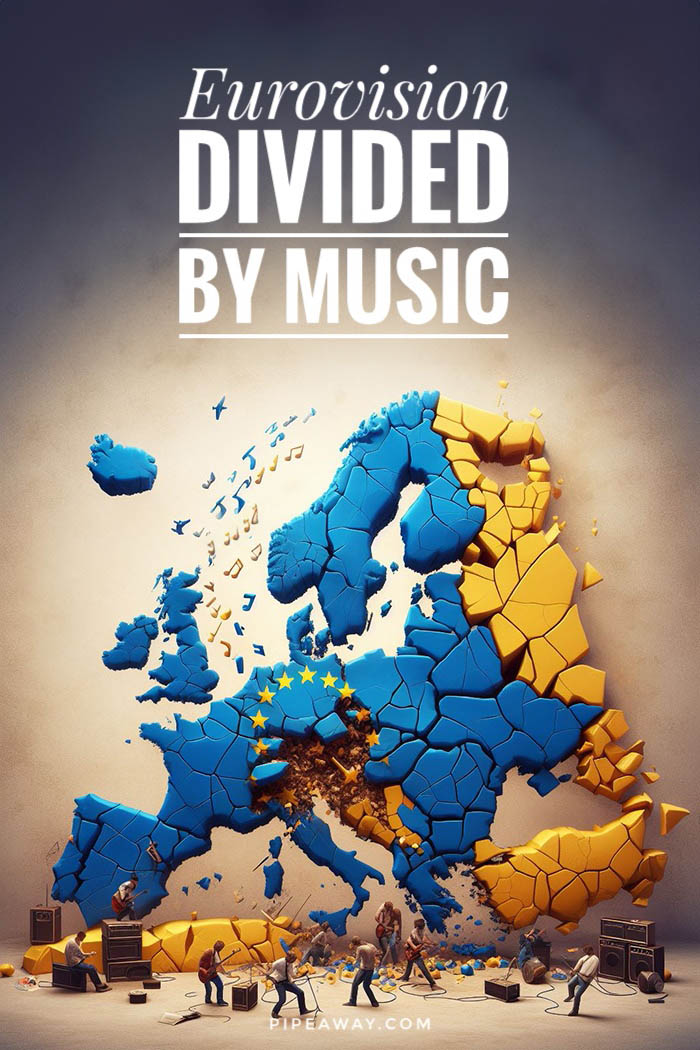
The AI images in this article, including the cover and pin image, have been created by Ivan Kralj with Dall-e and Adobe. The images from Eurovision performances have been captured by EBU photographers: - Corinne Cumming (Nemo, Baby Lasagna, Bambie Thug) - Sarah Louise Bennett (Eden Golan) - Alma Bengtsson (Joost Klein).
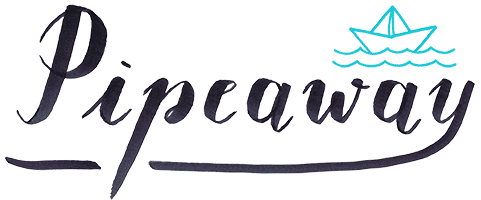
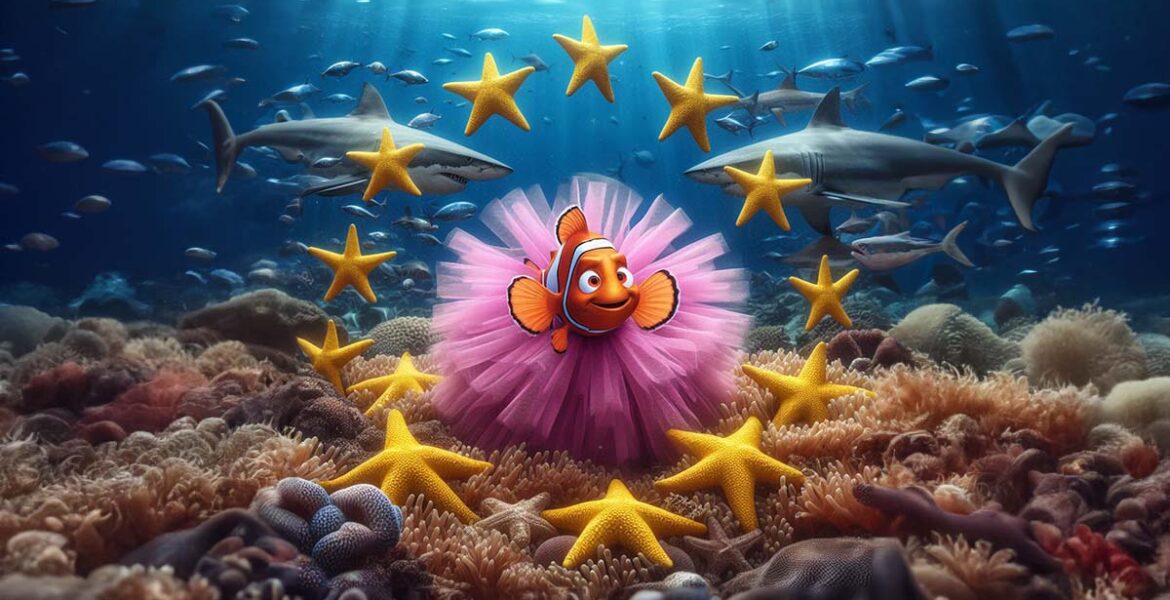

Thank you for a very interesting analysis. How ironic that “United by Music” turns out to be nothing more than wishful thinking, a mere pipe dream. Strange times we’re living in!
Thank you, Michael!
It’s certainly a testament to how complex and divided our world has become, despite our best efforts to unite, even if through music.
Eurovision continues to be a mirror reflecting the times we’re in.
Let’s hope the future brings more harmony both on and off the stage.
I don’t understand 1 thing: comparison of Russia and Israel. Russia has invaded Ukraine without provocation (apparently) while Israel has the fate of the victim’s guilt. Nothing would have happened if Hamas didn’t provoked the 7 October 2023, right? So they must be punished. Stop the war is very simple. Free the hostages and give the perpetrator what they deserve for killing more than 1300 innocent people. It seems logic, but no, everybody wants Israel to stop the war. If Hamas stop the fight, nothing will happen and there will be peace. If Israel stops fighting, they will be annihilated, right? Even the much hyped “from the river to the sea” means clearly only 1 thing – death to all Jews – and funny enough, that’s not anti-Semitism !!! Till one year ago any anti-Semitic action would have been penalized, but now it’s a real trend supported by million of dollars spent by Hamas and Iran. I don’t think anybody would have stopped the allies during the second world war half way into the war, except if the Germans would have surrendered unconditionally – why now a different approach?
Morris, I understand your perspective and the complexity of the situation.
The comparison between Russia and Israel in the context of Eurovision is more about how the EBU handles political controversies rather than equating the conflicts themselves. The point is that Eurovision aims to be a non-political event, but the reality is much more complicated.
Both the invasion of Ukraine and the ongoing war involving Israel have sparked significant political reactions and public opinions across Europe. This year, these issues have made it clear that even in a music competition, it’s hard to separate politics from art.
But it’s also important to note that nothing in the world is black and white. If I can explain it on the case of my own country: in the 1990s war, Croatia was attacked by Serbia, and yet that position couldn’t justify the war crimes committed by Croats. More than just general impression on who is a good or a bad guy, the public opinion is formed on how each, especially civilian victim is treated.
It will take time, just like it takes in the Balkans (rebuilding relations between nations is an ongoing process), to rebuild trust. This would probably happen only after a war ends, and individual culprits for crimes are prosecuted from both sides, to stop the cycle of death based on the question – who started it.
Until then, the EBU has and, in my opinion, should use its position in addressing deeply divisive issues with fairness. Protests against some of EBU’s decisions should not be equalized with antisemitism. That would be also very “black and white”.